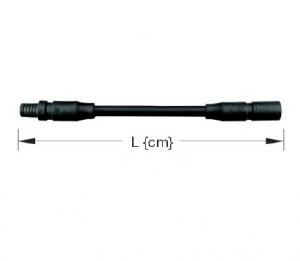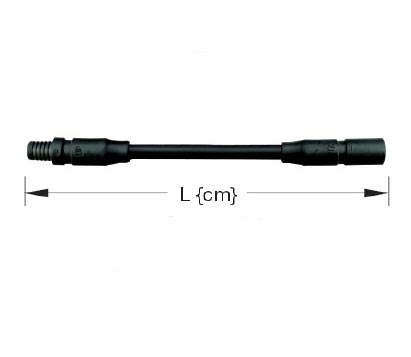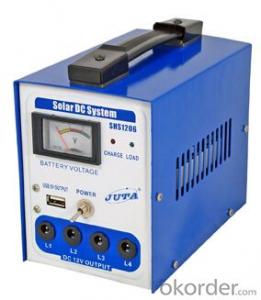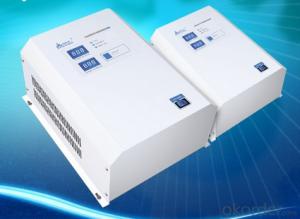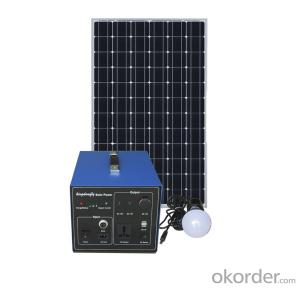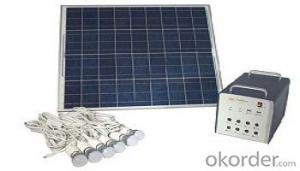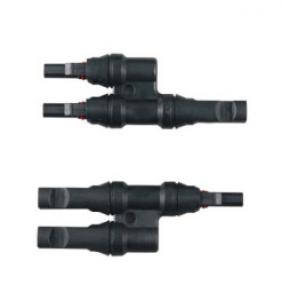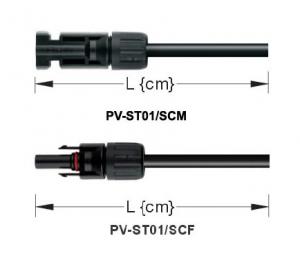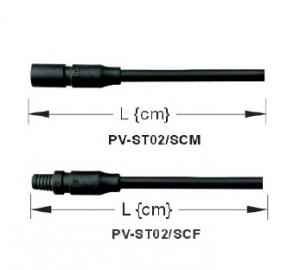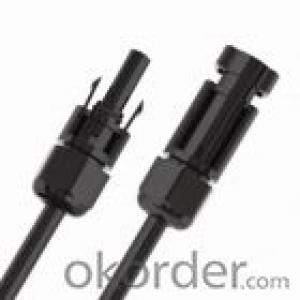Adithya Solar Energy Systems Solar Cable Connector ST01 SC
- Loading Port:
- China Main Port
- Payment Terms:
- TT OR LC
- Min Order Qty:
- -
- Supply Capability:
- 10000 set/month
OKorder Service Pledge
OKorder Financial Service
You Might Also Like
Solar Cable-Connectors,Due to highly robustness,UV-resistance,the touch protection a high grade connection is guaranteed for many years
Rated voltage 1000 V
Rated current 20A
Dia.of pin or socket 3mm
Protection degree(mated,junction box closed/unmated) IP67/IP2X
Operating temperature -40 °c to +85 °c
Contact material Copper,silver plated
Cable cross on request: 2.5mm2 4mm2
- Q: Can solar energy systems be used in rural areas without access to the power grid?
- Yes, solar energy systems can be used in rural areas without access to the power grid. In fact, solar energy is an ideal solution for off-grid communities as it provides a reliable and sustainable source of electricity. Solar panels capture sunlight and convert it into usable electricity through photovoltaic technology. This electricity can be used to power lights, appliances, and other electrical devices in homes, schools, healthcare facilities, and businesses. One of the main advantages of solar energy systems in rural areas without access to the power grid is their independence from traditional utility companies. These systems can operate autonomously, allowing communities to generate their own electricity without relying on external power sources. This is particularly beneficial in remote areas where extending power lines from the grid can be costly and impractical. Solar energy systems also have a long lifespan and require minimal maintenance, making them suitable for rural areas with limited resources and technical expertise. Additionally, solar panels produce clean energy, reducing reliance on fossil fuels and minimizing the environmental impact. Furthermore, solar energy systems can be combined with energy storage solutions, such as batteries, to store excess electricity generated during the day for use at night or during periods of low sunlight. This ensures a continuous power supply even without direct sunlight. Overall, solar energy systems are a viable and sustainable solution for rural areas without access to the power grid. They provide reliable electricity, reduce dependence on fossil fuels, and offer long-term cost savings.
- Q: Can solar energy systems be used in areas with extreme temperatures?
- Yes, solar energy systems can be used in areas with extreme temperatures. However, extreme temperatures can affect the performance and efficiency of solar panels. It is important to choose solar panels specifically designed to withstand extreme temperatures and to implement proper cooling mechanisms to prevent overheating. Additionally, extreme cold temperatures can also affect battery performance, so appropriate measures should be taken to ensure efficient energy storage in such areas.
- Q: Can a solar energy system be installed in a desert environment?
- Yes, a solar energy system can be installed in a desert environment. In fact, deserts are ideal locations for solar power generation due to the ample sunlight and lack of shading. The high temperatures in deserts can also increase the efficiency of solar panels.
- Q: How does shading affect the performance of solar energy systems?
- Shading can significantly impact the performance of solar energy systems by reducing the amount of sunlight that reaches the solar panels. This decreases the overall energy production and efficiency of the system. Even partial shading on a small portion of the panels can lead to significant power losses, as solar panels are interconnected and work as a whole. Therefore, it is crucial to design solar installations in areas with minimal shading to maximize their performance and optimize energy generation.
- Q: Can a solar energy system be used for charging electric vehicles?
- Certainly, electric vehicles can be charged using a solar energy system. Sunlight is captured by solar panels and transformed into electricity, which can be generated in places like rooftops, carports, or open areas. This clean and renewable energy can then power the charging of electric vehicles, eliminating the necessity for conventional fossil fuel-based charging methods. To meet the increasing demand for electric vehicles, solar-powered charging stations are being installed in various locations, including parking lots, highways, and residential areas. Utilizing solar energy for charging electric vehicles not only significantly reduces greenhouse gas emissions but also decreases our reliance on non-renewable energy sources. In this way, we contribute to creating a transportation system that is more sustainable and environmentally friendly.
- Q: Can solar energy systems be used in remote locations?
- Yes, solar energy systems can be used in remote locations. Solar panels can be installed in areas with no access to electricity grids, providing a reliable source of clean energy. The abundant sunlight in remote locations makes solar power an efficient and sustainable solution for meeting energy needs. Additionally, advancements in battery storage technology allow solar energy to be stored and used during nighttime or cloudy periods, further enhancing its suitability for remote areas.
- Q: How much does a solar energy system cost?
- The cost of a solar energy system can vary depending on various factors such as the size of the system, the location, and any additional equipment or services required. On average, a residential solar energy system can range from $10,000 to $30,000, but it is recommended to consult with a solar installer to get a more accurate cost estimate based on specific requirements.
- Q: How do solar energy systems impact public health?
- Solar energy systems have a positive impact on public health as they reduce air pollution by replacing fossil fuel-based power generation, resulting in cleaner air and improved respiratory health. Additionally, solar energy systems do not produce greenhouse gas emissions, which helps mitigate climate change and its associated health risks.
- Q: Can solar energy systems be used in areas with low sunlight?
- Yes, solar energy systems can be used in areas with low sunlight. While it is true that solar panels are most efficient in areas with abundant sunlight, they can still generate electricity even in regions with less sunlight. Solar panels are designed to harness both direct and indirect sunlight, allowing them to produce electricity even on cloudy or overcast days. Additionally, advancements in solar technology have made it possible for solar panels to capture and convert even the smallest amount of sunlight into usable energy. Therefore, while solar energy systems may not be as efficient in areas with low sunlight, they can still be a viable and sustainable source of energy in such regions.
- Q: Can solar energy systems be used in areas with limited access to solar energy advocacy campaigns?
- Yes, solar energy systems can still be used in areas with limited access to solar energy advocacy campaigns. While advocacy campaigns can help raise awareness and promote the benefits of solar energy, the actual implementation of solar systems depends on the availability of sunlight and technical feasibility. Even without active advocacy campaigns, solar energy can still be a viable and sustainable solution in areas with limited access to conventional energy sources.
Send your message to us
Adithya Solar Energy Systems Solar Cable Connector ST01 SC
- Loading Port:
- China Main Port
- Payment Terms:
- TT OR LC
- Min Order Qty:
- -
- Supply Capability:
- 10000 set/month
OKorder Service Pledge
OKorder Financial Service
Similar products
Hot products
Hot Searches
Related keywords
